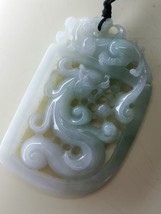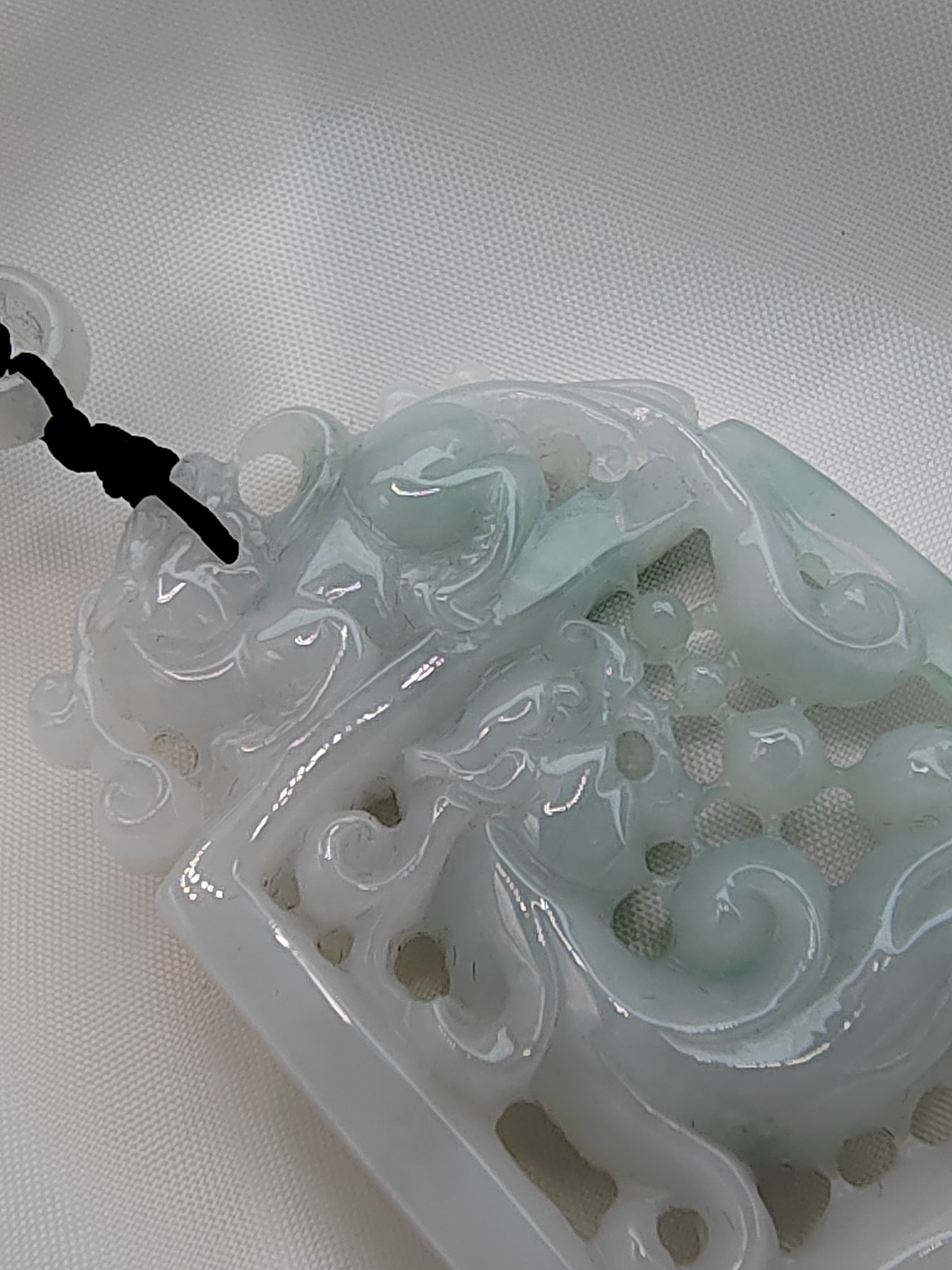Natural Burma Jadeite Jade Pendant
Fine Hollow Hand Carving Icy Ice Light Green 100% Natural Burma Jadeite Jade Dragon Pendant for Prosperity Longevity
With certificate (Authentic Type A Jadeite)
?????? ~ ???????????????????? / ????????????????
????A?????)
*Certificate No - FHN00190121430
*Materials - 100% Natural Jadeite Jade
*Refractive Index - 1.66 (spot measurement)
*Jadeite Size - approx - 58.50mm/37.40mm/8.20mm
*Weight - 31 grams
*Carat - 155 carats
*Original - Burma
*Package - 1 X Pendant with String / 1 X Gift Box / 1 X Certificate
*Delivery - Worldwide Free Shipping
*Item Video Display Link:- https://youtu.be/cmhcQFtbqVw
Only One Unit Available
************************************************************************
This is a precious natural Burmese jadeite jade pendant, which belongs to the icy ice light green variety. Meticulously carved from a natural light green jadeite jade raw stone, this exquisite pendant showcases intricate and delicate craftsmanship. It is a magnificent Kui Dragon jadeite pendant, expertly crafted with exceptional skill and featuring a hollow carving design. This pendant is truly a rare collectible, as there is only one of its kind. It is a perfect fusion of sculptural artistry and precious gemstone, accompanied by a certificate (Grade A natural jadeite) to verify its authenticity and quality. The pendant measures approximately 58.50mm x 37.40mm x 8.20mm and weighs about 31 grams, equivalent to 155 carats, highlighting its exquisite size and weight. Jadeite is renowned for its rarity, and this pendant exemplifies its preciousness. With its unique variety and superb craftsmanship, it holds significant value as a collector's item. The intricate carving on the pendant carries profound symbolism and contemplation. It represents the power and auspiciousness of the dragon, symbolizing authority and happiness. Thus, this jadeite pendant is not only an artistic treasure but also a symbol of good fortune and prosperity, embodying rich cultural connotations. Considering its rarity, collectible value, and symbolic carving, this jadeite pendant is truly exceptional. We hope that you will treasure and appreciate its unique beauty, and consider adding it to your collection.
The Rarity and Collectible Value of Natural Jadeite
Jadeite, often referred to as "imperial jade" due to its historical association with royalty, is a gemstone of unparalleled rarity and enduring collectible value. Its captivating allure lies not only in its exquisite beauty but also in its remarkable geological formation, making it a treasure sought by collectors and connoisseurs worldwide.
1. Geological Rarity: Natural jadeite is exceptionally rare, originating from remote deposits in Myanmar (Burma), where geological conditions of high pressure and low temperature over millions of years have given birth to this magnificent gemstone. It is estimated that less than 1% of jadeite mined globally meets the stringent quality standards for fine jewelry and investment-grade pieces.
2. Vivid Color Palette: Jadeite is celebrated for its diverse and vibrant range of colors, from the iconic imperial green to mesmerizing lavender, radiant white, and fiery reds. The vividness of these hues is unparalleled, and collectors are often drawn to the challenge of acquiring specific colors and shades.
3. Transparency and Texture: The transparency and texture of jadeite are equally important factors contributing to its desirability. Fine jadeite possesses a crystalline clarity that allows light to penetrate and illuminate the gem from within, creating a luminous, almost ethereal quality.
4. Cultural Significance: Throughout history, jadeite has held immense cultural significance in various civilizations, including China, where it symbolizes virtue, integrity, and longevity. This cultural reverence adds an additional layer of allure to jadeite, making it a cherished symbol of heritage and tradition.
5. Investment Potential: Beyond its intrinsic beauty, jadeite is increasingly recognized as a solid investment option. Its scarcity, combined with growing global demand, has resulted in significant appreciation in value over the years. Savvy collectors and investors view jadeite as a tangible asset with the potential for long-term capital appreciation.
6. Expertise and Certification: Due to the nuanced nature of jadeite, it is essential to rely on reputable gemological expertise and certification when acquiring pieces. Certificates from recognized gemological laboratories authenticate the quality, origin, and natural properties of the gem, instilling confidence in both collectors and investors.
7. Heirloom Quality: Jadeite is often considered an heirloom, passed down through generations as a symbol of family heritage and prosperity. Its durability and timeless appeal ensure that it remains cherished for centuries.
In conclusion, the rarity and collectible value of natural jadeite extend far beyond its aesthetic appeal. Its geological formation, captivating colors, and cultural significance make it a gemstone that transcends time and borders. For collectors and investors alike, jadeite represents not only a beautiful adornment but also a tangible piece of history and an enduring store of value.
Green jadeite is a rare gemstone that gets its color from the presence of chrome element. Due to its green color, it is considered a symbol of calmness and peace. It is also seen as a talisman that can help people get rid of troubles and annoyances. In addition, jadeite is believed to have healing properties and can help people recover their health. In Chinese culture, jadeite is considered a symbol of wealth and luck. It is believed to bring wealth and business success, therefore many people treat it as an investment piece or place it in positions that symbolize wealth, such as on an office desk. In addition, jadeite is a very popular gift because it not only has a beautiful appearance but also carries a positive meaning. Therefore, green jadeite is often given as gifts to loved ones, friends and family members.
Jadeite Dragon
Dragon have been a auspicious totems since ancient times. Ancient kings were symbolized by dragons, Dragon symbolize power and dignity. In ancient times the jadeite culture is the perfect combination with a lot of culture, like Maya and Chinese culture. The dragon was only used by the royal family but in modern times, people still regard it as a symbol of bravery, strength, authority and even auspicious. The dragon is a representative of longevity and a symbol of health, the homonym of the dragon and the Chinese character "long" implies that the wearer's business is prosperous, wealthy and auspicious.
The Kui dragon is a mythical creature in Chinese culture, often depicted as a combination of animal features such as a deer's body, dragon's head, fish scales, eagle claws, and antlers. According to legend, the Kui dragon appeared in the ancient Chinese book "Shan Hai Jing" and was ridden by the god Fuxi. It represents good fortune, drives away evil spirits, and symbolizes auspiciousness and blessing. In ancient China, the image of Kui dragon was commonly used in decorative arts, such as jade, bronze, porcelain, and architecture. Its appearance on these objects not only serves as an embellishment but also carries sacred meanings, as people believed it could invoke the protection and blessings of the gods. For instance, Kui dragon patterns were commonly seen on jade pendants and jewelry during the Ming and Qing dynasties, representing auspiciousness, good fortune, and safety. Apart from decorative arts, the Kui dragon also features in traditional Chinese music. The piece "Kui Long Yin" in the Guqin repertoire imitates the call and form of the Kui dragon, evoking the mystery and majesty of the mythical creature. In summary, the Kui dragon is a significant totemic figure in Chinese traditional culture, representing auspiciousness, mystery, and majesty. It plays an important role in the inheritance of Chinese art, decorative arts, music, and other aspects of cultural heritage.
?????????????
??, ????“????”, ????????????????, ???????????????????????????????????????????, ?????????????, ????????????????????
1. ?????: ????????, ??????????) ?????????????????????????, ????????????????, ????????, ???1%???????????????????
2. ???????: ?????????????????????, ???????????????????????????????????????????, ????????????????????
3. ??????: ???????????????????????????????????, ??????????????, ??????????????
4. ????: ?????????????????, ?????????, ?????, ????????????????????????????, ???????????????
5. ????: ????????, ???????????????????????????????????, ??????????????????????????????????????????
6. ???????: ?????????, ?????????????????????????????????????????????????????????, ?????????????
7. ????: ?????????????, ????, ????????????????????????????????
??, ????????????????????????????????????????????????????????????????????, ?????????????, ??????????????????????????
????
??????????????, ????????????, ??????, ?????????, ??????????????????????????????, ?????????????????????????, ????, ?????????????????, ??????????
1?????????, ???????????????????????, ???????????
2???????, ????, ????, ??????????????????????????
3????????????, ?????????, ????????????
4????????, ??????????“?”??, ??????????????
5??????????, , ?????????????????
?????????????????, ??????????????????????????????????????????????, ????????????, ??????????????????????, ?????????????????, ???????????????????????????, ??????????, ??????
(description exceeds maximum possible length)

































